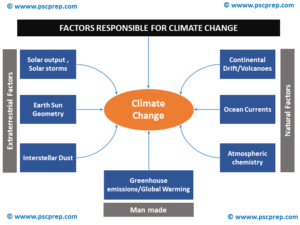What is climate change
Climate change refers to any significant change in the measures of climate lasting for an extended period of time. In other words, it includes major changes in temperature, precipitation, or wind patterns, among other effects, that occur over several decades or longer. Regardless of cause fluctuations over periods shorter than a few decades do not represent climate change.
Factors responsible
Climate change is caused by factors such as biotic processes, variations in solar radiation received by Earth, plate tectonics, and volcanic eruptions. Certain human activities have also been identified as significant causes of recent climate change, often referred to as global warming.

Human interference -Global Warming
Global warming refers to the recent and ongoing rise in global average temperature near Earth’s surface. It is caused mostly by increasing concentrations of greenhouse gases in the atmosphere. Global warming is causing climate patterns to change. However, global warming itself represents only one aspect of climate change.
Over the past century, human activities have released large amounts of carbon dioxide and other greenhouse gases into the atmosphere. The majority of greenhouse gases come from burning fossil fuels to produce energy, although deforestation, industrial processes, and some agricultural practices also emit gases into the atmosphere.
Greenhouse gases act like a blanket around Earth, trapping energy in the atmosphere and causing it to warm. This phenomenon is called the greenhouse effect and is natural and necessary to support life on Earth. However, the buildup of greenhouse gases can change Earth’s climate and result in dangerous effects to human health and welfare and to ecosystems.
Impact
Earth’s average temperature has risen by 1.5°F over the past century, and is projected to rise another 0.5 to 8.6°F over the next hundred years. Small changes in the average temperature of the planet can translate to large and potentially dangerous shifts in climate and weather. The evidence is clear. Rising global temperatures have been accompanied by changes in weather and climate. Many places have seen changes in rainfall, resulting in more floods, droughts, or intense rain, as well as more frequent and severe heat waves.
The planet’s oceans and glaciersare seriously affected. Oceans are warming and becoming more acidic, ice caps are melting, and sea levels are rising. As these and other changes become more pronounced in the coming decades, they will likely present challenges to our society and our environment
Climate change was incorporated in the title of the Intergovernmental Panel on Climate Change (IPCC) and the UN Framework Convention on Climate Change (UNFCCC). There have been multiple summits and initiatives to tackle the problem and mitigate the impact of climate change.
Click here for climate related summits carefully summarized by www.pscprep.com

The package consists of summaries of curated sources for studying the most critical subjects of UPSC in the most comprehensive manner. The summaries are prepared in consultation with exam toppers and serving/retired civil servants along with our own team of experts who ensure that you refer to the most relevant content in your preparation journey.
In the current exam scenario the bigger challenge is not the lack of material but the availability of excessive material that often confuses aspirants. Hence this package is our endeavor to minimize wastage and maximize utilization of an aspirants precious time. What will also be of interest to you is the fact that unlike many other institutions we have prepared the whole package in an editable format so that you can easily edit, append, delete the notes to suit your current preparation.
Quality of the notes is our most important focus. Coming from the house of PSCPREP you can be rest assured that the notes are of the topmost quality.